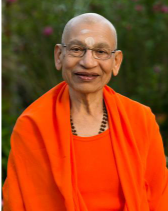
Spirituality

By Swami Viditātmānand Saraswati*
Ātmā is ānandasvarūpa
In the meantime, one elder happened to come over. Seeing all the boys crying, he asked the reason. The boys told the entire story about them starting from the trip in the morning and shared the fear that the tenth boy might have been lost or drowned. The elder glanced at all the boys. Seeing all the 10 boys in front of him, he made them stand in one straight line one more time. He asked one of the boys to come out of the line and count all the boys. After the boy counted from 1 to 9, the elder told him that he was the tenth one,tvaṁ daśamo’si.
Also read: Spiritual Discourse: Why my mind remains unhappy?
None of the boys was lost. All the ten boys were there only and still, their count was only for the nine. The count was not ten. Why was it happening? Because the one who was counting was not counting himself. Each one of the ten boys was counting all except for the self. They were forgetting to count the self as the tenth. Because of the ignorance of the fact that “I am the tenth”, they decided that the tenth boy was lost and then they started looking for him elsewhere. When will their search for the tenth boy end? When will they find the tenth boy? Where will the tenth boy be found?
Each of the boys who is searching is the tenth boy himself. However, it has been determined that the tenth boy is other than me and is somewhere else. Therefore, they keep looking for the tenth boy outside of themselves. When someone will show them their mistake, then each one of them will find the tenth boy in themselves. Similarly, because of the ignorance of the ātmā, a decision has been made that the happiness I am desiring for is outside of me. Therefore, I search for happiness elsewhere outside of myself. Searching for happiness elsewhere in this manner is the bahirmukhatā (Extroversion).
Upanishad says: पराञ्चिखानि व्यतृणत्स्वयंभूस्तस्मात्पराङ्पश्यति नान्तरात्मन्।
Īśvara, as though has destroyed the senses of all beings by making them extroverted. Therefore, they look outside for happiness, not in the antarātmā. ( Katha Upaniṣad 2-1-1). Bhagavāna has made human beings extroverted. Therefore, when searching for happiness, he looks at the objects of the world, notantarātmā. And our experience is also such that we feel happy when we get something we like, and we feel unhappy when we don’t get what we like or if we lose something we like, or get something we don’t like. Therefore, one comes to a decision that the nature of ātmā is unhappiness and happiness is the nature of theviṣayas(worldly objects). When alone, ātmā is unhappy and when it gets objects, it becomes happy. Let us give this some thought. Where does happiness come from? Is an object sukhasvarūpa (nature of happiness) or not? Is there an object called happiness in the world? Is it sold in any market? It does not seem like it. We get ice cream, pāṇīpurī, gold and silver ornaments, and nice clothes in the market, but we have not heard of getting happiness in the market. If happiness was to be found in the market, wouldn’t everyone buy it and become happy? But it doesn’t happen that way.
Also, people buy different things to be happy. Someone gets happiness from cold ice cream, and someone else gets happiness by drinking hot tea. Someone becomes happy by getting married and someone else becomes happy by getting a divorce. So, why does it so happen that everyone wants to get the same happiness and yet they all select different objects for that? That is because everyone has different interests. Everyone has a different notion of what they will get happiness from. Even so, doesn’t everyone get happiness from the things they like? Therefore, can’t we say that happiness lies in the things you like? No, you cannot say that. Then, how is it that we feel that we experience happiness from the objects? To understand the answer to that, let us analyze one experience of happiness. I got out of bed with a joyous mind. Soon after getting up, I got a desire to drink tea. Therefore, I lost my happiness. My happiness got hidden behind the desire that was generated in my mind to drink tea. Now, when the wife gave me a cup of delicious hot tea and I took the first sip of the tea, my desire to drink tea started disappearing. Until finishing up the entire cup of tea, my desire to drink tea completely disappeared. With that, the cloud cover of the desire which was hiding the happiness moved away and I experienced happiness. I believed that happiness came from tea. Then another desire was raised in my mind to read the newspaper. Again the mind became blurry by getting covered by the cloud of desire. When I read the newspaper, the cloud moved away and my mind became happy. In this manner, when a desire is born in the mind, it makes the mind restless and unhappy and when the desire is fulfilled, the mind freed from the cloud of desire seems to be experiencing peace and happiness.
However, this does not seem coherent with our experience. The happiness experienced by eating the ice cream of our choice is due to its taste only because we do not get happiness by eating the ice cream that is not good. Therefore, happiness comes only from the taste of the ice cream. No, that is not the case. What actually happens is that our mind is absorbed in the ice cream; if it is the ice cream of our choice, the mind gets freed from all the desires. The mind is freed from the cloud of desires, and dissatisfaction. As though the mind momentarily goes into samādhi. We hear a favourite song and get into samādhi. We sit in a favourite car and get into samādhi. When I get into such samādhi, when I forget about the awareness of myself and others, I feel joy. Even after consuming viṣaya, if we don’t get into samādhi, we do not get happiness from the viṣaya. While we are getting our desired object, and our desire changes in the meantime, the achievement of the desired object cannot make us happy. Thus, it is not a rule that obtaining the desired object makes us happy. On a particular day, we might have decided to go out to a restaurant with friends. Before the evening, we get the news of incurring a loss in a deal. Then, even eating our favourite dish at our favourite restaurant with our dear friends, we do not experience happiness. At the office, if in the afternoon the boss had insulted us, in the evening, playing with our dear child at home does not make us feel as happy as expected. In this manner, it is not necessary that experiencing a favourite thing gives happiness. However, it seems that if the mind is peaceful, free from disturbance and then if it experiences a favourite object, we experience happiness.
*Swami Viditatmananda Saraswati has been teaching Vedānta Prasthānatrayī and Prakaraṇagranthas for the last 40 years in Ahmedabad, Gujarat. Throughout the year, he conducts daily Vedānta discourses, accompanied by retreats, and Jñāna Yajñas on Vedānta in different cities in India and in foreign countries.






Very good speech for peace among all people in the world